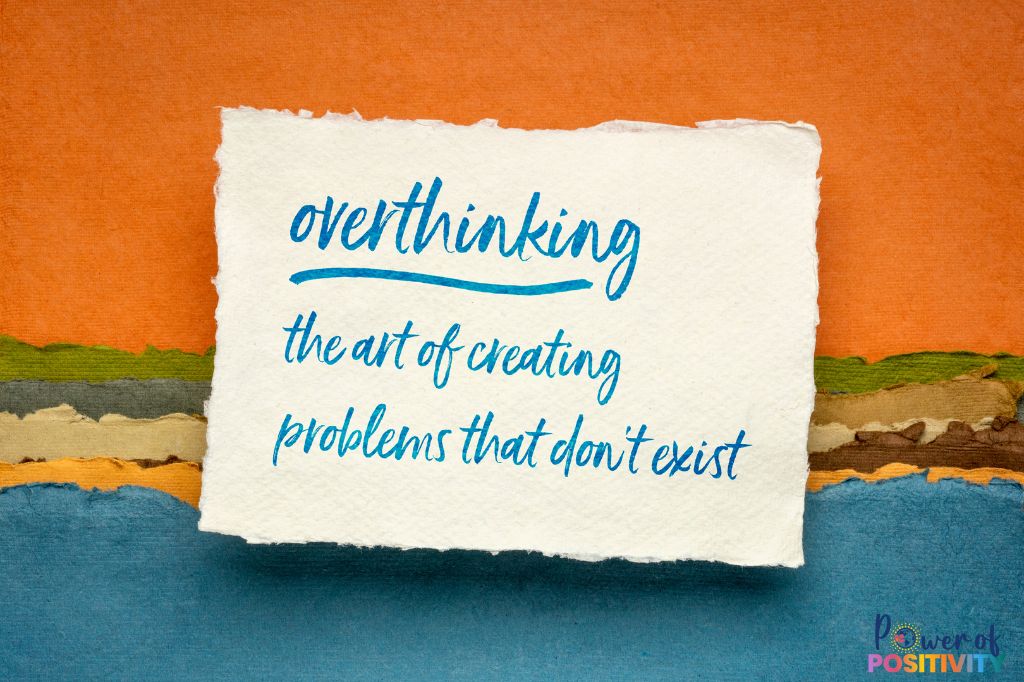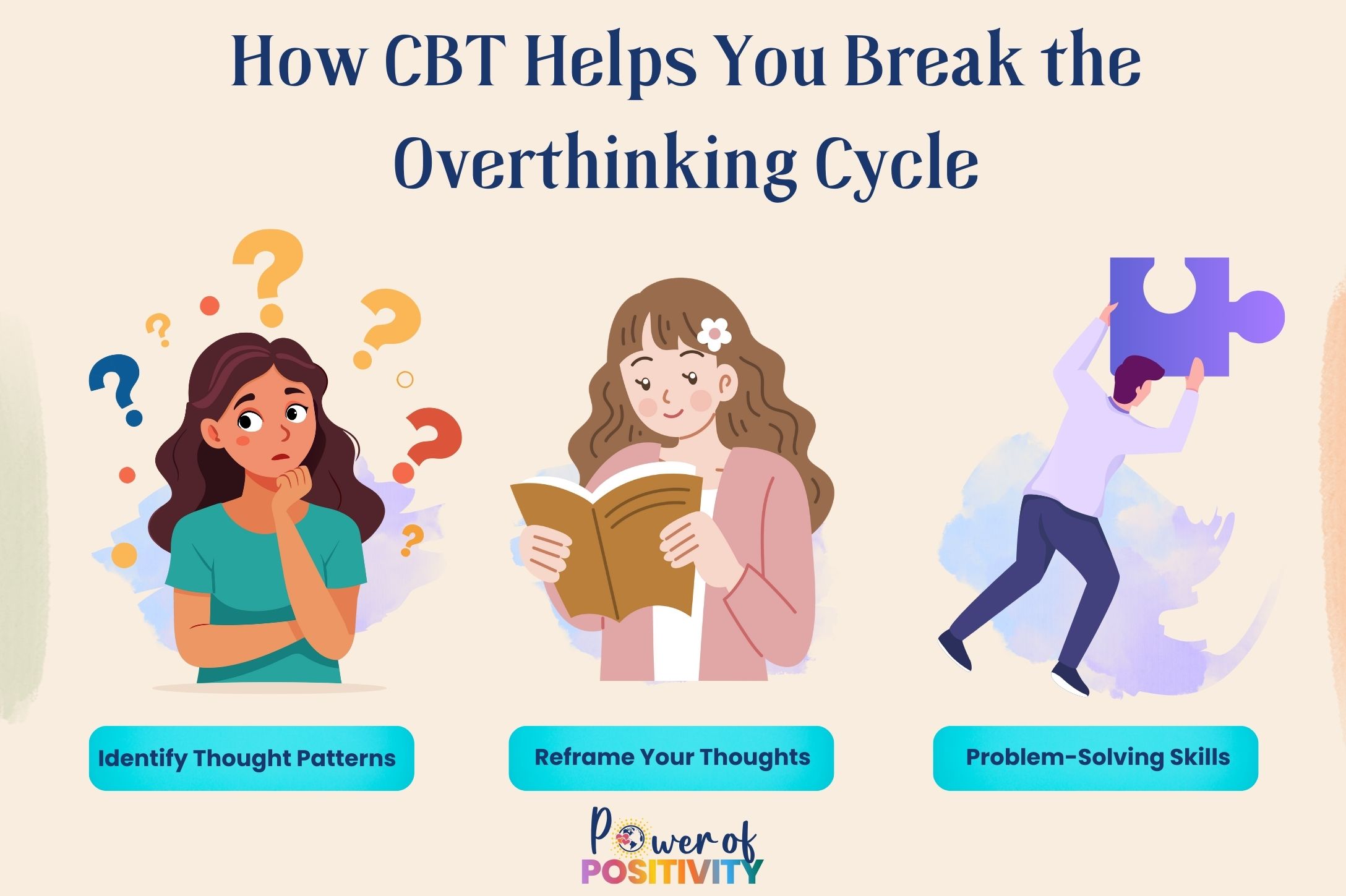Ever catch yourself lost in a whirlwind of thoughts? Overthinking is one of the biggest obstacles to peace and mental clarity. It feels like your mind has a mind of its own, spinning endlessly on every “what if.” But, here’s the good news: you can stop overthinking, and it’s easier than you might think.
This guide offers practical, proven ways to quiet your mind and regain control. From mindfulness techniques to reframing your thoughts, you’ll discover how to break free from the cycle of overthinking and finally breathe easy.
The journey starts here—let’s get you out of your head and back into your life.
What Are the Signs You’re Overthinking Too Much?
Before you can stop overthinking, you need to recognize when you’re doing it. Overthinking can manifest in different ways, often without you realizing it.
You might catch yourself replaying past events or obsessively second-guessing decisions you’ve already made. Some clear signs include:
 Dwelling on the past: Constantly replaying situations and conversations in your head, trying to analyze what went wrong or what you should have said differently.
Dwelling on the past: Constantly replaying situations and conversations in your head, trying to analyze what went wrong or what you should have said differently. Second-guessing decisions: Struggling to commit to choices because you keep questioning whether you made the right one.
Second-guessing decisions: Struggling to commit to choices because you keep questioning whether you made the right one. Fixating on what you can’t control: Worrying about events, people, or outcomes that are beyond your influence.
Fixating on what you can’t control: Worrying about events, people, or outcomes that are beyond your influence. Imagining worst-case scenarios: Constantly fearing the worst possible outcome, even when it’s unlikely.
Imagining worst-case scenarios: Constantly fearing the worst possible outcome, even when it’s unlikely. Overanalyzing conversations: Rehashing discussions in your mind, scrutinizing every word for hidden meanings or mistakes.
Overanalyzing conversations: Rehashing discussions in your mind, scrutinizing every word for hidden meanings or mistakes.
If you notice these signs regularly, you may be caught in an overthinking loop. It’s crucial to develop awareness as the first step toward breaking free.
How Does Overthinking Affect Your Life?
Overthinking doesn’t just stay in your head—it seeps into every aspect of your life. Mentally, it leaves you feeling drained, anxious, and overwhelmed, but the effects don’t stop there.
Over time, overthinking can take a serious toll on your body, relationships, and overall well-being.
- Physical Health: Constant worry leads to fatigue, headaches, and even digestive issues. You might find yourself tossing and turning at night, unable to sleep because your mind won’t shut off. Long-term, overthinking is linked to anxiety and depression, which can further impact physical health by increasing blood pressure and even contributing to heart problems.
- Emotional Health: Overthinking traps you in a loop of doubt and fear, making it hard to enjoy the present. It can cause you to fixate on things you can’t control, like past mistakes or future uncertainties, leading to feelings of helplessness and sadness.
- Relationships: When you overanalyze conversations or second-guess decisions, it can strain your relationships. You may find yourself constantly seeking reassurance, afraid that someone is upset with you, or misinterpreting their words. Over time, this emotional exhaustion can create distance in personal and professional relationships.
But while the effects of overthinking are wide-reaching, they are also manageable.
With the right tools, like mindfulness, cognitive behavioral therapy (CBT), and lifestyle changes, you can start breaking free from this mental habit and reclaiming your peace.
10 Secrets to Stop Overthinking and Find Peace
When you’re caught in the loop of overthinking, it can feel overwhelming and difficult to escape. However, there are practical steps you can take to quiet your mind and regain peace.
These 10 secrets offer a mix of mindfulness techniques, reframing strategies, and simple habits that can help you stop overthinking and find a sense of calm.
Let’s explore each one, and how it can guide you toward mental clarity and tranquility.
 Practice Mindfulness – Stay grounded in the present.
Practice Mindfulness – Stay grounded in the present. Reframe Negative Thoughts – Shift your mindset from worry to balance.
Reframe Negative Thoughts – Shift your mindset from worry to balance. Engage in Physical Activity – Use movement to clear your mind.
Engage in Physical Activity – Use movement to clear your mind. Limit Overanalyzing – Avoid second-guessing small decisions.
Limit Overanalyzing – Avoid second-guessing small decisions. Set Boundaries for Worry – Allocate specific “worry time” and let it go afterward.
Set Boundaries for Worry – Allocate specific “worry time” and let it go afterward. Use Deep Breathing – Calm your mind with intentional breathing exercises.
Use Deep Breathing – Calm your mind with intentional breathing exercises. Practice Gratitude – Focus on what’s going well to reduce anxiety.
Practice Gratitude – Focus on what’s going well to reduce anxiety. Journaling – Write down your thoughts to release mental clutter.
Journaling – Write down your thoughts to release mental clutter. Develop Problem-Solving Skills – Approach problems logically, not emotionally.
Develop Problem-Solving Skills – Approach problems logically, not emotionally. Seek Professional Help – Use CBT techniques to break negative thought cycles.
Seek Professional Help – Use CBT techniques to break negative thought cycles.
How Can Mindfulness Help Stop Overthinking?

Mindfulness is one of the most effective tools for stopping overthinking. By bringing your awareness to the present moment, mindfulness allows you to let go of the worries that stem from dwelling on the past or stressing about the future.
Through techniques like deep breathing, body scanning, and meditation, mindfulness can calm your racing thoughts and help you break the overthinking cycle.
 Observe Thoughts: Mindfulness helps you step back and notice when you’re overthinking, breaking the loop by creating distance between you and your thoughts.
Observe Thoughts: Mindfulness helps you step back and notice when you’re overthinking, breaking the loop by creating distance between you and your thoughts. Sit with Emotions: It encourages you to experience discomfort rather than avoid it, reducing the urge to overanalyze emotions.
Sit with Emotions: It encourages you to experience discomfort rather than avoid it, reducing the urge to overanalyze emotions. Ground Yourself in the Body: Focusing on sensations like your breath or heartbeat pulls you out of your head and into the present moment.
Ground Yourself in the Body: Focusing on sensations like your breath or heartbeat pulls you out of your head and into the present moment. Breathe Deeply: Simple breathing exercises, like 4-7-8, calm your body and quiet your thoughts.
Breathe Deeply: Simple breathing exercises, like 4-7-8, calm your body and quiet your thoughts.
Is It Possible to Stop Overthinking Everything?
It is possible to stop overthinking, but it requires consistent effort and self-awareness. Start by recognizing when your thoughts are spiraling, and consciously shift your focus to the present moment. Instead of aiming for perfection, allow yourself to embrace imperfection and uncertainties.
Acknowledge that not every situation needs to be overanalyzed. By practicing mindfulness, you can gradually train your mind to let go of unnecessary worries.
The process takes time, but each step forward helps you build resilience against overthinking. Begin with small changes, like challenging one unproductive thought each day. Over time, these small adjustments become habits, allowing you to cultivate a calmer, more grounded mindset.
While it may not be easy at first, developing mental discipline will empower you to overcome the habit of overthinking and experience greater mental clarity.
Can Cognitive Behavioral Therapy (CBT) Help Overcome Overthinking?

Yes, Cognitive Behavioral Therapy (CBT) is one of the most effective tools for managing overthinking. CBT helps you identify negative thought patterns and teaches you to challenge and reframe them with more balanced, realistic perspectives.
If you often feel stuck in your thoughts, CBT could be a game-changer.
- One of the key steps in CBT is recognizing when your thoughts are distorted or unhelpful. Overthinking often leads to worst-case scenarios or catastrophizing, which increases anxiety. CBT helps you spot these patterns early so you can take control before spiraling further.
- Once you identify a negative thought, CBT encourages you to question its validity. For example, instead of thinking, “I’ll fail,” you might reframe it as, “I’ve prepared, and I’ll do my best.” This shift can significantly reduce anxiety and overthinking.
- Overthinking stems from wanting to avoid mistakes or find perfect solutions. CBT helps develop problem-solving skills, giving you the confidence to handle situations without getting stuck in a cycle of worry.
- CBT also uses mindfulness techniques to help you stay present. Instead of ruminating on the past or stressing about the future, mindfulness grounds you in the here and now, reducing the tendency to overthink.
FAQs
What Role Does Movement Play in Stopping Overthinking?
Physical activity distracts from overthinking by shifting focus to your body. Movement releases endorphins, improving mood and reducing anxiety. Even 10 minutes of exercise can significantly calm the mind.
How Can You Reframe Negative Thoughts to Stop Overthinking?
Reframing involves questioning negative thoughts and replacing them with balanced alternatives. Shifting from “I’ll fail” to “I’ll do my best” reduces anxiety and stops overthinking from spiraling out of control.
Why Is Journaling Effective for Overthinking?
Journaling externalizes your thoughts, providing clarity and relief. It helps identify patterns and triggers, reducing mental clutter. Regular positive journaling can improve well-being and lower stress levels.
How Does a Healthy Lifestyle Help You Stop Overthinking?
A healthy lifestyle, including good nutrition, regular exercise, and sleep, supports mental clarity. It reduces stress, improves brain function, and helps prevent the mental fatigue that often triggers overthinking.
When Should You Seek Professional Help for Overthinking?
Seek professional help if overthinking disrupts daily life, relationships, or mental health. Cognitive Behavioral Therapy (CBT) is effective in breaking negative thought cycles and managing chronic overthinking.
Final Thoughts
Overthinking doesn’t have to rule your life. With the right techniques, like mindfulness and reframing thoughts, you can break free from the mental loop. Start small, be patient, and don’t expect perfection.
Remember, it’s all about progress, not a quick fix. The more you practice, the better you’ll get at calming your mind.
So, give yourself permission to relax. Life’s too short to overthink every detail. Breathe, let go, and enjoy the ride!
The post How to Stop Overthinking? 10 Secrets to Find Peace appeared first on Power of Positivity: Positive Thinking & Attitude.








 Dwelling on the past: Constantly replaying situations and conversations in your head, trying to analyze what went wrong or what you should have said differently.
Dwelling on the past: Constantly replaying situations and conversations in your head, trying to analyze what went wrong or what you should have said differently. Second-guessing decisions: Struggling to commit to choices because you keep questioning whether you made the right one.
Second-guessing decisions: Struggling to commit to choices because you keep questioning whether you made the right one. Fixating on what you can’t control: Worrying about events, people, or outcomes that are beyond your influence.
Fixating on what you can’t control: Worrying about events, people, or outcomes that are beyond your influence. Imagining worst-case scenarios: Constantly fearing the worst possible outcome, even when it’s unlikely.
Imagining worst-case scenarios: Constantly fearing the worst possible outcome, even when it’s unlikely. Overanalyzing conversations: Rehashing discussions in your mind,
Overanalyzing conversations: Rehashing discussions in your mind, 
 Practice Mindfulness – Stay grounded in the present.
Practice Mindfulness – Stay grounded in the present. Engage in Physical Activity – Use movement to clear your mind.
Engage in Physical Activity – Use movement to clear your mind. Limit Overanalyzing – Avoid second-guessing small decisions.
Limit Overanalyzing – Avoid second-guessing small decisions. Set Boundaries for Worry – Allocate specific “worry time” and let it go afterward.
Set Boundaries for Worry – Allocate specific “worry time” and let it go afterward. Use Deep Breathing – Calm your mind with intentional breathing exercises.
Use Deep Breathing – Calm your mind with intentional breathing exercises. Practice Gratitude – Focus on what’s going well to reduce anxiety.
Practice Gratitude – Focus on what’s going well to reduce anxiety. Journaling – Write down your thoughts to release mental clutter.
Journaling – Write down your thoughts to release mental clutter. Develop Problem-Solving Skills – Approach problems logically, not emotionally.
Develop Problem-Solving Skills – Approach problems logically, not emotionally. Seek Professional Help – Use CBT techniques to break negative thought cycles.
Seek Professional Help – Use CBT techniques to break negative thought cycles. Observe Thoughts: Mindfulness helps you step back and notice when you’re overthinking, breaking the loop by creating distance between you and your thoughts.
Observe Thoughts: Mindfulness helps you step back and notice when you’re overthinking, breaking the loop by creating distance between you and your thoughts. Sit with Emotions: It encourages you to experience discomfort rather than avoid it, reducing the urge to overanalyze emotions.
Sit with Emotions: It encourages you to experience discomfort rather than avoid it, reducing the urge to overanalyze emotions. Ground Yourself in the Body: Focusing on sensations like your breath or heartbeat pulls you out of your head and into the present moment.
Ground Yourself in the Body: Focusing on sensations like your breath or heartbeat pulls you out of your head and into the present moment.